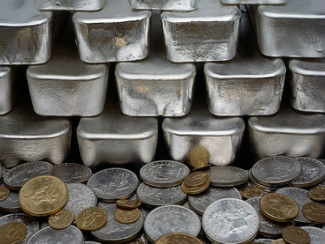Silver IRA
WHY INVEST IN SILVER IRA?
Investment portfolios often comprise diverse investment options to offset seasonal or unexpected fluctuations in the stock markets. Stocks and bonds as well as other paper-based investments were the only options available until the 1990’s when Individual Retirement Accounts were open to precious metal investments as well. Silver has always enjoyed immense popularity and significance over the ages. Standing next only to gold, the metal has been relatively affordable when compared to exorbitant gold prices.
With Individual Retirement Accounts now permitted to include precious metal investments, paper-based investment account holders can invest in Silver IRA by rolling over their investments into a Silver account – also known as a Silver 401k, by way of opening a new self-directed retirement account.
Self-Directed IRA
Trustees or custodians who handle retirement account operations only deal with select investment options that mainly include paper-based instruments such as; mutual funds, bonds, stocks and convertible debentures. Not everyone is qualified or experienced enough to deal with these premium metals.
Individuals can now open self-directed Individual Retirement Accounts to diversify investments to suit their needs. However, this can be put into great effect with some professional help. These types of investment accounts have the capacity to deal with precious metals in their physical forms.
Rolling Over Existing IRA Investments
Individuals can invest in Silver IRA by choosing to create a new investment account or by adding silver to an existing retirement account if the custodian supports the scheme.
As with any other Individual Retirement Account, cash contributions are accepted for Silver IRA using silver which the custodian or trustee acquires, based on the investor’s instructions and safely stores the physical bullion bar or coins inside an approved depository firm.
Instead of using cash, investors can make better use of their existing traditional or Roth IRAs by rolling over or transferring funds from these accounts into the relatively more valuable and secure Silver IRA. For such transfers, a request needs to be put forward to the custodians.
IRS allows individuals to maintain multiple retirement accounts subject to an annual deferred contribution limit that is exempt from taxation. Individuals who are 50 years or older can park up to $6,000 per annum across multiple accounts, while those below 50 years are allowed to invest $5,000 in them.
Conventional IRAs
Two types of Individual Retirement Accounts have been prevalent over the years. Both the traditional and Roth IRA are common options widely adopted, but unfortunately offer very little cover against fluctuating economic conditions.
Traditional IRAs allow for a tax exemption on the annual contributions to the accounts. Contributions are deducted from the gross earnings prior to tax calculations. While the account compounds free of tax, withdrawals from the traditional IRA are subject to taxes and penalties are levied on premature withdrawals. Investments used to fund education or home acquisitions are still taxable, though exempt from penalties.
On the other hand, Roth IRAs do not offer any tax sops on the annual contributions. The account is allowed to compound free of tax and withdrawals after retirement are also tax free, as the initial contributions have been made from the net income.
Both types of accounts, however, are paper-based and are subject to depreciation associated with the currency. Given the uncertain economic scenario of present times, investments in paper-based instruments and conventional IRAs may not be really sufficient to offset inflation in the years to come.
Why Invest in Silver IRAs?
Investing in precious metal Individual Retirement Accounts such as gold, silver or platinum proves to be a diversified, secure yet incremental approach to secure the future. They serve as a hedge against inflation that constantly affects and primarily erodes the value of paper-based assets, assuring a steady pace of long-term growth.
Investments in stocks and bonds require careful management to make the money work better. Shorting stocks are not allowed in these types of accounts; however, reinvestments are permitted as long as the transactions do not figure in the list of restricted IRA investments. Reinvesting stocks may also prove beneficial, as IRS rules related to IRAs do not require investors to pay taxes for stocks sales as long as the proceeds are not withdrawn. The same transaction in a normal scenario is bound to attract a capital gains tax. This benefit when applied to a Roth IRA can improve returns considerably, as withdrawals from Roth IRAs are totally exempt from tax.
Despite all these factors, investing in silver is a long-term, hassle-free investment option as the metal continues to gain value in the open markets, is very popular and in high demand across the electronic and healthcare sectors – especially dentistry. Investors can be rest assured once the procurement has been made, as the value of metal – though prone to fluctuation, will anyway offer better returns when compared to other currency-based investment options.
Managing a Silver IRA
Silver or any other precious metal Individual Retirement Accounts should be opened and managed with the help of custodians or trustees who are familiar with the requirements of investing in precious metals. The investor simply submits a request along with the contribution and written directions. This would enable the custodians or trustees to handle all deals on the investor’s behalf.
The responsibility of procurement and sale of the physical asset in the form of bullion bars or coins, safe storage and handover to investor lies within the custodian.
IRS guidelines only allow specific types of metal into these retirement accounts. These items should conform to specific purity and authenticity clearances by approved sources. Stored silver is expected to be at least 99.95 percent pure, with select custodians raising the bar to 99.90 percent purity. IRS has cleared Silver Philharmonic coins from Austria, Silver Maple Leafs from Canada, Proof Silver and Silver American Eagle coins to be used. Silver 401k or the Silver IRAs may also include silver bars such as 100 oz Johnson Matthey bar, and the 10 oz Pamp Suisse and Credit Suisse bars.
Not all trustees deal in costly metals. Charges of setting up such investment accounts often include a one-time setup fee, annual fees for paperwork and account statements, annual fees related to insurance and storage of the physical asset, plus additional fees for handling contributions, purchases and sales of the metal.
Tax Implications
It is important for investors to watch for prohibited investments, such as collectibles, as they may not offer any tax benefits. This is because the funds that go into the collectible are treated as distribution; they are taxable and also attract a penalty for prohibited transactions, irrespective of whether the object is held or sold off. Withdrawals from precious metal IRAs are subject to tax.
In general, IRS requires that investors begin to make minimum withdrawals once they are 70½ years old. All withdrawals, except from Roth IRAs, are taxable with traditional IRA schemes commonly slapping a 10 percent penalty on premature withdrawals made before 59½ years.
Alternatives to Invest in Silver IRA
There are other indirect ways to invest in these metals if investors are still wary about storing precious metal in a physical form in a depository, despite the guaranteed safety and security. Investors could also request that their custodians use their contributions to buy shares in companies that are into mining such metals, or shares of exchange-trade funds (ETFs) that track a specific metal.
Investors should first check if their Individual Retirement Account is allowed to own and deal in metal ETFs before opting for the scheme. However, dealing in metal mining stocks does not pose any tax complications.
IRA investments need adequate professional advice and guidance to handle all tax implications associated with several investment options in them, as these options are treated quite differently from a taxable account. Adequate care should always be taken to maximize benefits and minimize penalties while investing in any retirement account.

Claim Your Free Gold & Silver Investing Kit
(shipped to your front door completely free)




